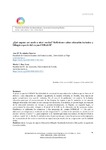Mostrar o rexistro simple do ítem
¿Qué supone ser sordo a nivel escolar? : reflexiones sobre educación inclusiva y bilingüe a partir del corpus CORALSE
| dc.contributor.author | Fernández-Soneira, Ana | |
| dc.contributor.author | Bao-Fente, María C. | |
| dc.date.accessioned | 2023-12-29T12:32:39Z | |
| dc.date.available | 2023-12-29T12:32:39Z | |
| dc.date.issued | 2021-04-28 | |
| dc.identifier.citation | Fernández-Soneira, A., & Bao-Fente, M. C. (2021). ¿Qué supone ser sordo a nivel escolar? Reflexiones sobre educación inclusiva y bilingüe a partir del corpus CORALSE. Revista De Estilos De Aprendizaje, 14(27), 46–61. https://doi.org/10.55777/rea.v14i27.2819 | es_ES |
| dc.identifier.issn | 1988-8996 | |
| dc.identifier.uri | http://hdl.handle.net/2183/34720 | |
| dc.description.abstract | [Resumen] A pesar de que la UNESCO ha defendido la necesidad de una educación inclusiva que se base en el derecho a una educación de calidad e igualitaria, la escuela ordinaria, en España, dista mucho de poder considerarse una escuela inclusiva. En el caso de la población con sordera, la inclusión educativa pasa por el reconocimiento de las lenguas de signos y por la asunción de un modelo bilingüe-bicultural. Partiendo de este concepto de inclusión, se analizará, en primer lugar, la situación de la educación inclusiva en Europa y, pormenorizadamente, en España; en segundo lugar, se caracterizará la educación bilingüe y el papel de la LSE en la educación de las personas sordas. Finalmente se utilizarán las respuestas a dos preguntas del corpus CORALSE―“¿En qué se diferencia un colegio para sordos de uno de integración?”; “¿Cómo te ha afectado ser sordo a nivel escolar, laboral y social?”―, para responder a la cuestión que titula este trabajo. El objetivo final es analizar, a partir de un diseño de método mixto, la percepción que tienen las personas sordas signantes de la educación de los sordos a través de su experiencia personal y de su comparación con la realidad actual. | es_ES |
| dc.description.abstract | [Abstract] Despite the fact that UNESCO has defended the need for an inclusive education based on the right people have to a quality and equal education, standard schools in Spain are far from being considered inclusive. As regards deaf population, educational inclusion depends on the recognition of sign languages and on the assumption of a bilingual-bicultural model. Starting from this concept of inclusion, we will analyze the situation of inclusive education in Europe, with special reference to Spain; then, we will characterize bilingual education and the role of LSE in educating deaf people. Finally, we will use the answers to two questions that are collected in the CORALSE corpus-“How is a school for the deaf different from an integration school?”; “How has being deaf affected you at school, work and social level?” -, to answer the question that this work poses. Our final aim is to analyze, from a mixed method design, the perception that deaf people who use sign language have of the education of the deaf before and now through their personal experience and its comparison with the current reality. | es_ES |
| dc.description.sponsorship | El presente artículo se enmarca dentro de las investigaciones del proyecto CORALSE. Conocimiento y reconocimiento de la lengua de signos española a través de un corpus interuniversitario anotado,financiado por el Ministerio de Economía, Industria y Competitividad, (FFI2017-86309-P) | es_ES |
| dc.description.sponsorship | Ministerio de economía, Industria y Competitividad; FFI2017-86309-P | es_ES |
| dc.language.iso | spa | es_ES |
| dc.publisher | EduSoc Lab | es_ES |
| dc.relation.uri | https://doi.org/10.55777/rea.v14i27.2819 | es_ES |
| dc.rights | Atribución-NoComercial-SinDerivadas 3.0 España | es_ES |
| dc.rights.uri | http://creativecommons.org/licenses/by-nc-nd/3.0/es/ | * |
| dc.subject | Lengua de signos | es_ES |
| dc.subject | Educación bilingüe-bicultural | es_ES |
| dc.subject | Inclusión | es_ES |
| dc.subject | Educación en igualdad | es_ES |
| dc.subject | Colectivo sordo | es_ES |
| dc.subject | Sign language | es_ES |
| dc.subject | Bilingual-bicultural education | es_ES |
| dc.subject | Inclusion | es_ES |
| dc.subject | Equal education | es_ES |
| dc.subject | Deaf community | es_ES |
| dc.title | ¿Qué supone ser sordo a nivel escolar? : reflexiones sobre educación inclusiva y bilingüe a partir del corpus CORALSE | es_ES |
| dc.title.alternative | What does it mean to be deaf at school? : reflections on inclusive and bilingual education from the CORALSE corpus | es_ES |
| dc.type | info:eu-repo/semantics/article | es_ES |
| dc.rights.access | info:eu-repo/semantics/openAccess | es_ES |
| UDC.journalTitle | Revista de estilos de aprendizaje | es_ES |
| UDC.volume | 14 | es_ES |
| UDC.issue | 27 | es_ES |
| UDC.startPage | 46 | es_ES |
| UDC.endPage | 61 | es_ES |
Ficheiros no ítem
Este ítem aparece na(s) seguinte(s) colección(s)
-
GI-EILOE - Artigos [19]






